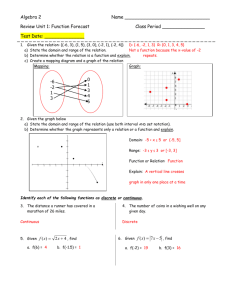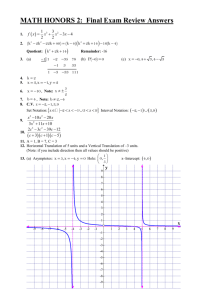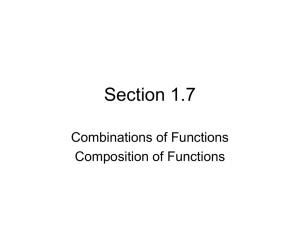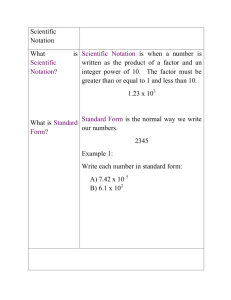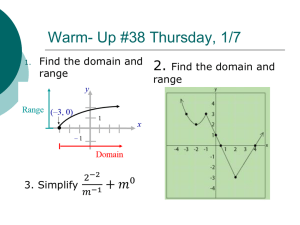Chapter 0 Test Review on functions and precalculus
advertisement
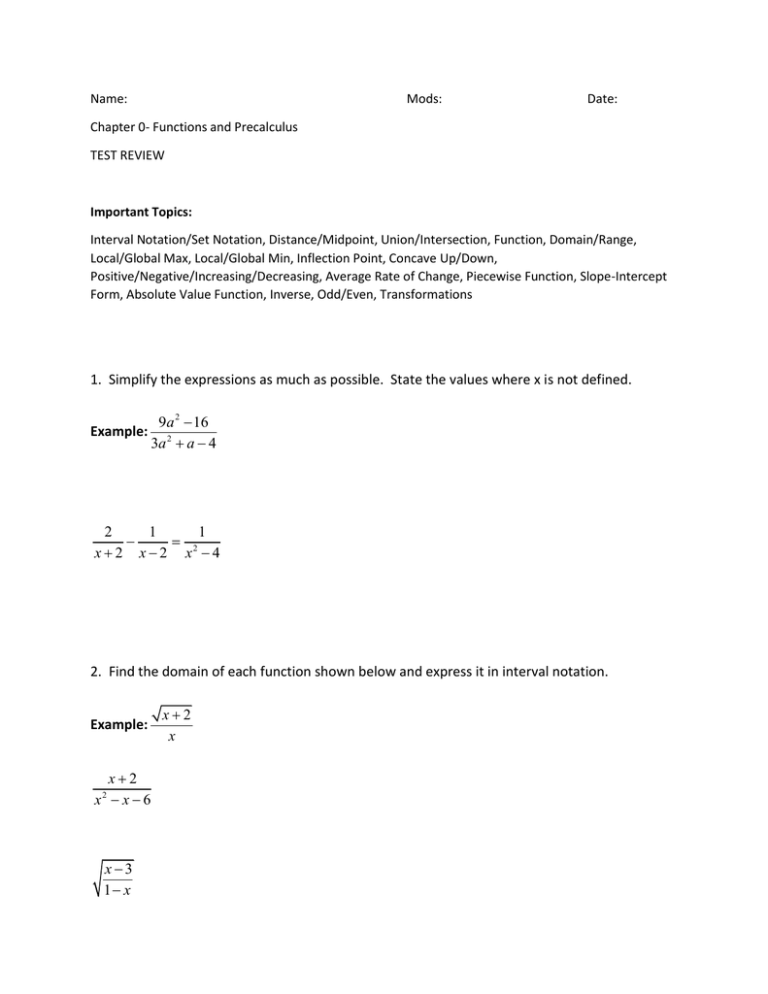
Name: Mods: Date: Chapter 0- Functions and Precalculus TEST REVIEW Important Topics: Interval Notation/Set Notation, Distance/Midpoint, Union/Intersection, Function, Domain/Range, Local/Global Max, Local/Global Min, Inflection Point, Concave Up/Down, Positive/Negative/Increasing/Decreasing, Average Rate of Change, Piecewise Function, Slope-Intercept Form, Absolute Value Function, Inverse, Odd/Even, Transformations 1. Simplify the expressions as much as possible. State the values where x is not defined. Example: 9a 2 16 3a 2 a 4 2 1 1 2 x2 x2 x 4 2. Find the domain of each function shown below and express it in interval notation. Example: x2 x x6 2 x 3 1 x x2 x 3. Solve the following. Write solutions to inequalities in interval notation. Example: 2 x 2 5 x 3 0 2 x y 4 3x 2 y Example: x3 x 0 x 2 7 x 10 0 4 x2 6 x 2 2 x2 5x 3 3x y 2 3 y 1 x Example: 6 x 2 x3 9 x x 1 0 x2 4. Write the solution to the following absolute value function in interval notation: Example: |3x-4| < 5 |7 – 4x| < 11 5. Determine if the points are on the graph of the function f ( x) x 2 1 x3 . Example: (1, 1) (0, 1) (1, 0) 6. Use a graphing calculator to help you find the domain and range of the following function Example: f ( x) f ( x) 5 3 x 16 2 1 5 x 4 2 7. For the piecewise function below, calculate f(-2), f(0), f(0.5) and f(3). 3 x 1 if x 0 if 0 x 1 4 x3 if x 1 f(-2) f(0) f(0.5) f(3) 8. Use the function to the right to find: a.) Use interval notation to describe where the graph is increasing. b.) Use interval notation to describe where the graph is decreasing. c.) Use interval notation to describe where the graph is positive. d.) Use interval notation to describe where the graph is negative. e.) Use interval notation to describe where the graph is concave up. f.) Use interval notation to describe where the graph is concave down. 9. Write an equation for a linear function whose graph has a slope of 3 and passes through the point (2, 7) 10. Write an equation for a linear function whose graph passes through the points (1, 2) and (4,6). 11. Given the f is an invertible function, fill in the blanks. If f(2) = 5, then f-1(5) = __________. If f-1(0) = -1, then f(-1) = __________. If (3, 6) is on the graph of f, then __________ is on the graph of f--1. 12. Given that f ( x) x and g ( x) 4 x 2 , find the domain of f(x) and g(x) Example: find an equation and the domain for ( g f )( x) find an equation and the domain for ( f g )( x) 13. Find the inverse of: Example: f ( x) 4 x 2 f ( x) 1 3 x2 14. Write the following as a piecewise function: Example: g(x) = |2x+6| h(x) = |4x + 7| 15. Suppose the point (8, -5) is on the graph of f(x). Find a point on the graph of 2f(x) ____________________ Find a point on the graph of f(2x) _____________________ Find a point on the graph of f(x) – 3 _____________________ Find a point on the graph of f(x+7) + 10 ____________________ If f(x) is symmetric over the y-axis (“EVEN”), find another point on f(x) ____________________ Ex. If f(x) is has rotational symmetry (“ODD”), find another point on f(x) ____________________ Ex. 19. Describe the transformation from y = x2 to the following graphs. Example: y 4 2( x 1)2 y 5 3( x 2)2 20. Find the average rate of change of the function: Example: f(x) = 2x-1 over the interval [-2, 0] f(x) = 3x2 – 7 over the interval [-3, 1] p.91: 3, 7, 9, 11, 13, 19, 21, 25, 27, 33
